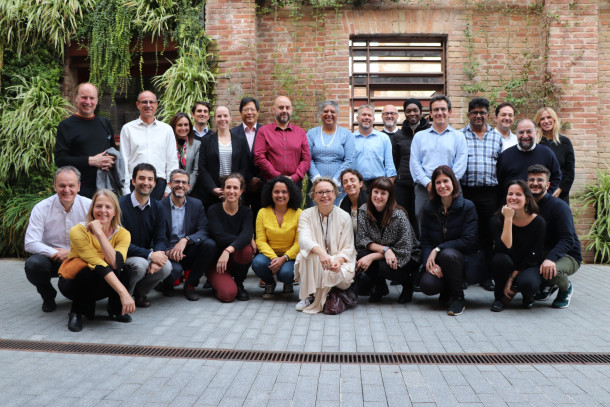
First steps towards the Metropolis Action Plan 2021-2023
In view of the next Metropolis World Congress, when the past three years will be assessed and our new Action Plan will be launched, the Secretariat General organized a strategic meeting with a variety of stakeholders
The meeting, convened on the 26th and 27th November in Barcelona, brought together a group of 39 people, including the Secretariat General staff, representatives from 12 Metropolis members, as well as partners and collaborators, to reflect on the achievements of the 2018-2020 Action Plan and discuss on new global trends, discourse and deliverables to be included in the next Metropolis Action Plan (2021-2023). It was facilitated by Rehana Moosajee, founder The Barefoot Facilitator.
The first day started with insights on metropolitan planning. In a global context where urban sprawl is a growing trend, metropolitan spaces are increasing not only in number, but also in size, and diversity. The architect & urban/regional planner Eric Huybrechts, in charge of the International and European affairs for L'Institut Paris Region, offered a presentation of the current global context of metropolization and the key challenges of metropolitan planning. You can read the presentation by clicking here.
Following this presentation, the Secretariat General team was in charge of running the “Metropolis Market Place”, where the activities carried out by Metropolis during the past years were “sold” as items of different market stalls, which the other participants approached as potential “buyers”. This was an opportunity to present and explain, in an entertaining and interactive manner, the activities that are aligned with the current 2018-2020 Action Plan, in the fields of gender mainstreaming, Metropolis congresses, pilot projects, urban innovation, research & knowledge, and learning & training.
On the same day, two additional participatory activities took place to discuss the evolution of Metropolis evolution since its foundation in 1985 and how the association is positioned in the current ecosystem of local government networks and other global institutions.
The second day started with a conversation in the fishbowl format, which allowed participants to bring different perspectives on how to benchmark Metropolis against other local government networks and reflect on the core actions that it should be focusing on in the coming years.
Moment during the fishbowl conversation
“The wealth of Metropolis is the diversity of its membership and all the different urban realities they experience, which are a tool to learn from each other’s experiences.”
Nicholas You, Advisor for Guangzhou International Award for Urban Innovation
“There are a lot of territories that are looking for answers about how to develop metropolitan governance. Metropolis has to be a global hub on these issues and be able to provide answers with a regional approach.”
Rahmatouca Sow, Chief deputy of cabinet of the Mayor of Dakar and Metropolis Regional Secretary for Africa.
The fishbowl conversation was followed by simultaneous small group meetings to wrap-up the different insights arisen during the two days, concluding with some strategic focus areas for Metropolis from 2021 to 2023. The discussions revolved around the key thematic issues of the association, whether there should be a re-orientation of core focus areas and how they should be clustered, the balance between Metropolis’ technical and political orientations, and the skills and competencies required for the Secretariat General team to address these concerns.
In the coming months, the Metropolis Secretariat General will be working on the draft of the Metropolis Action Plan 2021-2023, which will be presented to the approval of our members’ General Assembly at the 13th Metropolis World Congress, taking place from October 27-30, 2020, in Guangzhou.

